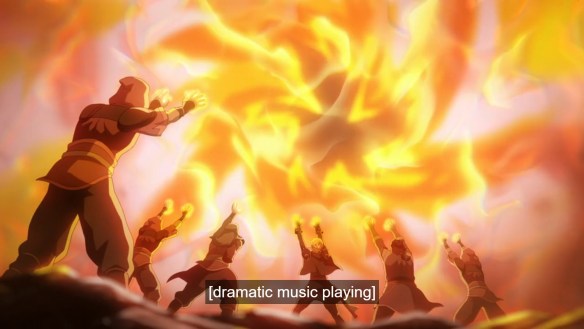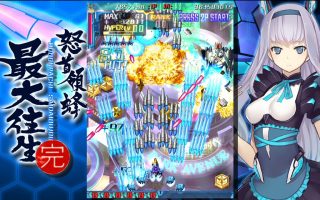Hello folks, and welcome back to Wrong Every Time. Today we’re returning to Vox Machina in a moment of absolute catastrophe, which seems at this point to be the default state of our luckless party. Percival has straight-up died, which I must confess I never saw coming. Character death is the most extreme dramatic tool in the entire DnD kit, and as I’ve said in the past, more often tends to be narratively destructive than useful. Sure, you can always roll a new character, but that character won’t have the same connection to the campaign as your deceased hero, and premature character death can leave someone’s personal arc awkwardly unfulfilled. These issues can be mitigated through effective DM-player discussion (or ignored, if you’re just a bunch of interchangeable murder hobos), but nonetheless make character death a naturally fraught, generally discouraged possibility.
Beyond that, the team have also at last gathered their allies and sprung their trap on Thordak, only to learn that his trap involved manipulating their trap, thanks to that dastardly double agent Raishan. As such, their hard-won allies are now cooking in dragonfire while they assess a newly sealed secret entrance, having gambled their hopes on a dragon’s loyalty. It’s a fairly sticky situation!
As for my own DnD adventures, we went through a bit of a hibernation period over the end of the year, but that left me plenty of time to construct my next major questline. Having mostly written straightforward adventures that are pretty close to linear roller coasters, I decided to push myself to write something more open-ended, which resulted in the creation of a frontier town packed with four different intersecting subquests, culminating in a Seven Samurai-style town defense bringing all those subquests’ characters back into play. As a storytelling perfectionist who overwrites everything, I fear I may have simply created a different kind of linear narrative with lots of linking steps, but I’m doing my best to facilitate more unscripted, emergent drama, and I’m eager to see how this experiment plays out. Anyway, enough about me – let’s get back to the dragon fight!
Episode 9
We return to a scene much like the one we left, with the party’s allies burning while the party reconsider their life choices
I wonder how much of this sequence of betrayals was actually drawn from the group’s tabletop games. “The enemy you’d secretly converted was still working for your nemesis all along” is a fair enough beat in a traditional narrative, but when you’re actually controlling the protagonists, such a twist feels a lot like “you know all that work you did, charming and negotiating and plotting an intricate plan of attack? It’s all worthless, because of information you couldn’t have possibly discovered.” Players need a sense of genuine agency and control over their destiny, and while you can effectively rip the ground out from under them occasionally, a big part of creating that sense of agency comes through allowing them to make their own plans, and rewarding them with success if those plans are reasonable ones. Unexpected, groundless twists are a tricky gambit even when it comes to reader investment – for player investment, the standard of respecting the audience’s expectations is actually much higher
My general solution to this issue of wanting to reward players for their investment while still allowing room for complication or twists is generally some variation on “you succeed, but also this happens.” Players will accept an unexpected, unfortunate consequence of their choices so long as they also receive their due reward for making smart decisions
This issue also points to one of the general, embedded limitations of DnD storytelling: it tends to hang pretty closely to the shonen “friendship, effort, success” paradigm simply because those are the ways you mechanically allow players to invest in the world and see that investment rewarded. Stories about the futility of conflict or coming to terms with mortality can be incredibly compelling, but players in a DnD campaign rarely find satisfaction in being told “in spite of all your desperate efforts, nothing ever truly changes, and death comes to all”
“There’s still Thordak’s main entrance.” “Oh, the one with Thordak’s kids patrolling it? The one we said was too dangerous?” This is a fine way to balance the disappointment of a failed plan – it doesn’t make your work impossible, it just means you have to take the more dangerous path that you were hoping to avoid. DMs are supposed to put obstacles in their players’ way, but those obstacles must always contain a clue to their own circumvention or destruction
Grog “blacks out for a second” and offers a genuinely thoughtful, well-organized plan of attack. You can have a lot of fun playing the party fool, but the role is inherently limiting; every time you come up with a genuinely clever idea you’re essentially “breaking character,” necessitating hokey devices like this to occasionally let you meaningfully participate. I can see why players who are less comfortable expressing themselves would gravitate towards simple bit characters like Grog, but I’m also not surprised that Grog’s player Travis jumped to an eloquent party leader type after years of playing the idiot
Their allies are actually putting up a fight! You can really feel this show’s increasingly generous production in the sense of scale, complexity of simultaneous animation, and elegance of post-production effects in these open battles scenes
Some nice conversational payoffs as characters like Syldor and Cassandra bounce off each other for the first time. One DnD payoff I’ve attempted to exploit as frequently as possible is the “Pokémon Effect” of essentially collecting friends as you navigate the lands, then drawing them all together for big collective confrontations. Character writing is both my passion and strong suite, so I worked hard to provide my players with an actual community of allies, and had all three acts of their main campaign culminate in collective battles with their friends at their side
Zahra and Kash show up in the nick of time, another satisfying, bond-flattering beat. Last-minute rescues by trusted allies are a nice way to navigate the intersection of agency and surprise – their unexpected appearance technically steals some agency from the party, but they’re only appearing because of the party’s previous efforts in earning their friendship, meaning it still feels like the party is being rewarded for their own actions
Meanwhile, the twins work to clear the baby dragons from the front door. You do need some degree of complications facing the players’ plans; for as much as planning out an attack is a lot of fun, actually having that plan proceed with total smoothness is kinda boring. Players want to be both surprised and rewarded, and DMs must find their own ways to navigate that semi-contradiction
Zahra and Kash are wreaking some serious havoc from atop their flying disc spell. Flight’s a tricky one in DnD; it’s honestly pretty easy to acquire the ability to fly, and that sorta undercuts most physical movement challenges from there on out. I’m still seeking ways to design physical challenges for high-level characters, but I’m starting to think it’s just not a workable combo without such overbearing constraints as “all your magic is turned off in this cave”
Keyleth is knocked aside, and briefly sees Raishan striding towards Thordak. Plans within plans!
I do like how often the party is being forced to erect shields for fleeing soldiers. It’s pretty hard to physically threaten a high-level DnD character, but surrounding them with vulnerable innocents can rapidly change the math
Seems Kash has one of those neat spears that multiply into a bunch of spirit-spears when flung. I’m not a big fan of DnD’s standard worldbuilding (no surprise, as it sort of has to be an “everything to everyone” hodgepodge), but it does possess some fun signature weapons
Kash is struck down, and Vax watches as he is taken by the raven queen. How death is handled in DnD might be my least favorite aspect of its mechanical design; in order to facilitate truly dangerous battles, death is made extremely cheap, a momentary inconvenience that can be undone by any reasonably accomplished healer. This basically makes the concept of a “heroic sacrifice” or “untimely death” invalid; stories can’t really be about how death affects those left behind, because death in DnD has very little meaning. Mercer has clearly solved this problem by inventing the raven queen’s “natural order” that must be respected, and I’ve had to come up with my own ad-hoc solutions to the triviality of death, but it feels like a space where game design convenience has been dramatically prioritized over narrative consequence
The party members vow to avenge Kash. If not for Mercer’s unique worldbuilding choices, Kash’s death could have easily been reversed by either Pike or Keyleth – as I said, it’s not something that the game takes very seriously
I very much like how Pike’s new breastplate isn’t entirely under her control yet – it’s powerful, but attempting to harness that power can spark the occasional feedback blast. Seems like a good way to add both some controllable variance and a sense of progression to her development – my campaign offered a similar progression route through our rogue’s materia system
Zahra gives Pike an inspiring speech, telling her that Kash always believed she was the proper choice for the vestiges. Funny how much rich, compelling drama can be drawn from a meaningful death! Almost seems like death being inconsequential is kind of a limit on storytelling, huh? Alright, fine, I’ll stop
Surprisingly, Grog and Scanlan actually do a fantastic job of destroying the just-hatching dragons. I actually quite like this as a fight concept – the players must destroy a field of eggs as they’re hatching, with the emergent enemies putting a natural time constraint on their progress. Think I might just steal that one myself
Grog once again pushes the limits of his alleged intelligence by concocting a plan to bring Thordak’s cave down upon him. It can be fun to play the fool during comedy beats, but I’m sure it gets frustrating during big, important fights
The two barely escape, but it seems Scanlan doesn’t survive the exit. Man, they are really going murder-happy this season!
“It’s not the armor. It’s me!” Pike’s arc culminates in an “it was never the dancing shoes” bit that feels perfectly appropriate – she’s always worried about whether her actions will cause others to lose faith in her, but ultimately has to embrace having faith in herself. A nice way to integrate her Everlight conflicts with her psychological journey
Pike shatters Thordak’s crystal at last, and Raishan pops up for a final re-betrayal of the dragon king before Vax strikes the final blow. Man, fuckin’ dragons, huh?
In the aftermath, Pike reveals that Scanlan isn’t dead, but won’t wake up. Others aren’t so lucky; panning across the battlefield, we see all of the party’s friends tending to the wounded and the dead. A tricky effect to evoke in tabletop play, where such a moment would be pure exposition asking the players to feel sorry for invisible ciphers – this is why the death of genuine known characters like Kash is essential, as only they can evoke a sensation of genuine loss in the players who’ve come to know them
Aw shit, there’s still time for a FOURTH Raishan betrayal!? Fuckin’ dragons!
And Done
Thus Raishan escapes with Thordak’s corpse, undoubtedly precipitating the real threat lurking in the shadows, and presumably making use of that weird black orb the party just sorta left floating in Percy’s basement. Nonetheless, this was a lovely climactic episode that certainly offered me plenty to talk about regarding DnD, even if largely in terms of how this episode doesn’t really resemble how things play out in a tabletop situation. I might actually look back and check how fully Mercer actually integrated the party’s allies into this all-out assault, as it’s a tricky thing to manage a bunch of allied NPCs alongside the party without either slowing down the action or making the players feel a bit superfluous. Also definitely gonna poach that egg encounter (pun absolutely intended); I think I’ve even got a spot in an upcoming quest where it would fit nicely. Thanks for the help, foolish Vox Machina!
This article was made possible by reader support. Thank you all for all that you do.




